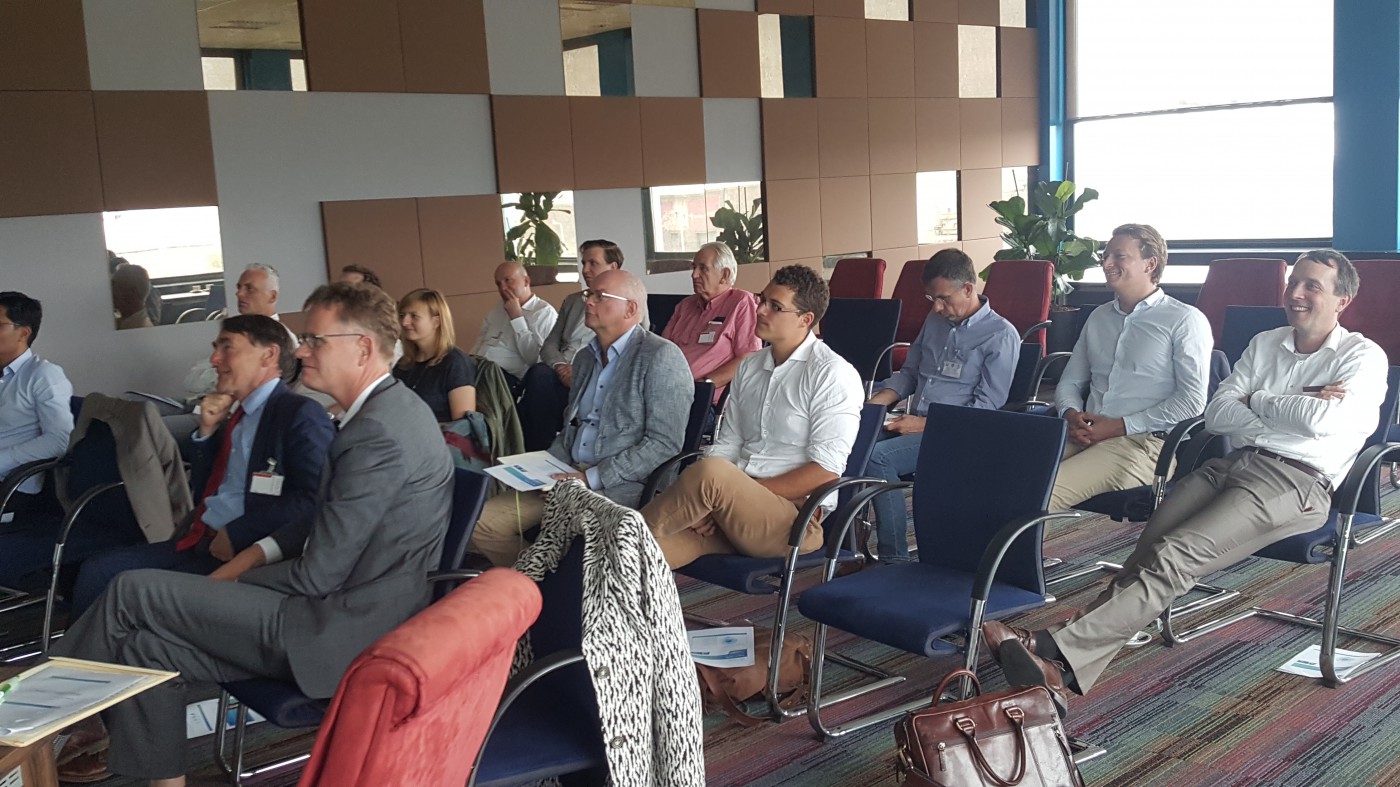

Lively exchange of ideas at VoltaChem’s business community meeting on renewable energy carriers
07-07-2019 | Community | Event report
 On Wednesday 26 June the second VoltaChem business community meeting of 2019 was all about Renewable Energy Carriers. Representatives from industry sectors such as power generation, oil industry, renewable energy and new energy management gathered at the Uniper Maasvlakte site. There, VoltaChem/TNO experts brought them up-to-date in understanding energy chains, both nationally and internationally.
On Wednesday 26 June the second VoltaChem business community meeting of 2019 was all about Renewable Energy Carriers. Representatives from industry sectors such as power generation, oil industry, renewable energy and new energy management gathered at the Uniper Maasvlakte site. There, VoltaChem/TNO experts brought them up-to-date in understanding energy chains, both nationally and internationally.
"Welcome at the doorstep of the energy transition". With these words, Muhammad Zubair, Senior Project Executive Industrial Customer Solutions at Uniper, greeted the participants of the business community meeting. Uniper is turning its site into a hub for sustainable energy. Many options have been explored or are still under investigation - think of utilization of biomass (to fire the power plant, or as feedstock for a biorefinery), production of hydrogen, capture, and utilization of CO2, the use of metals as fuels, power-to-steam, and power-to-gas facilities, and so forth. "We support all kinds of ideas to harbor the energy transition", said Zubair. With his informative and interesting presentation, not hesitant to reply to inquisitive questions, Zubair set the tone for a constructive meeting where all participants contributed in an open and informal atmosphere.
The Voltachem business community offers a platform to meet relevant stakeholders in the entire value chain, exchange knowledge and explore interesting investment opportunities together.
At four meetings annually, subjects such as the future of electrification, road mapping, and (inter)national agenda-setting are discussed. The meeting at Uniper was set up as a 'Masterclass Renewable Energy Carriers'.
Getting renewable energy to Europe
Anastasia Gavrilova, Strategic Business Analysis consultant at TNO, started the masterclass with an overview of the future of energy in the Netherlands and Europe. She presented an analysis of the future energy mix and the role of renewables therein. According to Gavrilova, the prime question will be where the necessary 600 petaJoules of future non-fossil energy will be generated.
Looking at the geographical 'sweet spots' the options are plentiful; from wind parks at the North Sea and in Morocco, to solar farms in Italy, Greece or in the Sahara. Getting the energy to the user requires sophisticated supply chains where - again - choices have to be made. Will electrons carry all those petaJoules, traveling along with high voltage cables? Or would it be smarter to store them in hydrogen, methanol, ammonia, or other molecules, and ship those to Europe?

Subsequently, VoltaChem's Robert de Kler presented a more detailed overview of the various energy carriers, their conversion and transport options, and the associated capital and operational costs. This gave rise to valuable and interesting discussions where it was taken for granted that individual contributors had their personal preferences, motivated by their business activities.
Rather than a yes/no exchange of viewpoints, the discussion was characterized by a constructive exchange of ideas and respectful questioning of assumptions.
Assembled brainpower
In the following part of the master class, the participants were requested to discuss viable options for importing renewable energy to the Netherlands in three separate groups. The subsequent presentations of the groups showed the assembled brainpower, reflecting amongst others on transporting liquid ammonia or hydrogen from Morocco ("ammonia will be the new oil") and using hydrogen to carry energy from Russia or the Middle East towards Europe.
In-depth discussions
It was the prelude to a presentation by TNO's Coen de Vos on the 'system model' that TNO is building to evaluate energy import options. The model, that has just gotten under construction, will not provide ultimate solutions, but facilitate strategic decision making by providing techno-economic input. Discussion continued, both on details as well as the assumptions underlying the model.  Although business interests can prevent sharing too much - if any - information, most participants seemed to talk freely. According to one of them: "Electrification and its role in the energy transition is so complex that discussions can be quite in-depth, even without revealing information you want to keep to yourself". As a result, this VoltaChem Business Community meeting succeeds in providing common ground and a playing field with knowledgeable participants, that can even be competitors.
Although business interests can prevent sharing too much - if any - information, most participants seemed to talk freely. According to one of them: "Electrification and its role in the energy transition is so complex that discussions can be quite in-depth, even without revealing information you want to keep to yourself". As a result, this VoltaChem Business Community meeting succeeds in providing common ground and a playing field with knowledgeable participants, that can even be competitors.
Join VoltaChem's community
More information on the Voltachem business community can be found here on our website. Do you have any questions, or like to join VoltaChem? Please contact our community manager Monique Rijkers (+31 6 233 465 16 ). Or you can use this interest form. We also offer a free trial option.
Business community members can download the presentation in the library.
Share this page: